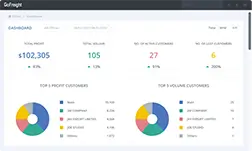Freight forwarders have plenty of responsibilities on their shoulders when it comes to transporting the goods of their clients across the seas in a timely and efficient manner. Transporting these goods is both the central source of their revenue and the extension of the companies proficiency to get the job done. It’s during these moments when you need to consider whether getting a freight forwarding insurance policy is beneficial to your business.
Most people would agree that having freight forwarding insurance on hold will be one of the smarter moves anyone could make. Ensuring you can cover and potentially lose goods could save you on having angry customers on hands, for example. For this article, we’ll be going through everything you’ll need to know about the importance of having freight forwarding insurance.
What is freight forwarding insurance?
Freight forwarding insurance is a policy that can be purchased from an insurance company that covers the partial or complete cost of the freight. This policy is exclusive to the freight forwarding company and their specific shipment, one which only deals with their claims. Dealing with freight forwarding policy is too much different from general insurance policies, such as home or car insurance. If you have any experience in dealing with those, then you should have some sort of familiarity with how the insurance system works.
The owner of the shipping company shall purchase a policy that covers the load, negotiate the terms of the policy, and lastly, pay the premium depending on the predetermined contract.
Overall, freight forwarding insurance follows the same guidelines as any other insurance, extra coverages make it even more expensive while having less will ensure the policy will be less pricey. Typically, the coverage will evaluate the cargo’s total value and base the rates off a percentage. This percentage will then decrease to more compared to traditional insurance policies.
If a freight forwarding company does experience any damages, loss, or theft, they will have up to 30 days to file a claim with their insurance company. When the case has been finally processed, the freight forwarder will be compensated depending on the coverages agreed upon.
Is it necessary to have freight forwarding insurance?
If you want to make sure you can protect the goods of both yours and your clients, then yes, having one would be a good idea. Freight forwarding companies are not required to have an insurance policy for their business, so in some way, it’s not necessary. It’s entirely legal for a company to transport goods or commodities without having a policy on hand.
On the other hand, the freighter will require liability coverage, but this should not be confused with freight forwarding insurance. Although, it’s crucial for a company that is a part of the shipping industry to have coverage in place since any risk that does occur will be blamed on them.
Another thing to be aware of is that freight advancers, brokers, and third-party logistics companies are not required to implement freight forwarding insurance policies into their contract or bill of ladings. It’s one of the many reasons why understanding the importance of freight insurance is crucial because most freight forwarding businesses do not consider it an essential part of their business, which can lead to severe problems to arise along the way.
You need to consider your client’s point of view when shipping their goods. Do they want to partner up with a business that doesn’t care about the liability of their shipments security?
Keeping in mind that they are relying on your company to get their wares to their rightful location and showing them you care can build up a ton of goodwill. While it’s your responsibility as a freight forwarder to get the cargo from one place to another, sometimes things can go wrong along the way. From bad weather to pirates, anything can cause damage or loss of these precious goods. Having a way to cover this in case that happens can benefit you in the long run.
The benefits of freight forwarding insurance
To get a better picture of the benefits of acquiring freight forwarding insurance, we’ll need to go over the ins and out of the insurance policy as a whole.
Liability Coverage
Like we stated up above this particle, every carrier is required by law to have liability coverage. This liability coverage will be able to reimburse a percentage of the cargo’s worth and will safeguard every carrier in case a shipment goes wrong. Although, there is something to be aware of from this situation.
One of the main reasons why these regulations, laws, and liability coverage exist is to protect the carrier and not the shipper. For that matter, the carrier will be capable of legally arguing that pretty much anything exposed to the cargo to damage will excuse them from being blamed. Additionally, by having the one insurance that’s enforced by the law, liability coverage will defend the transporter, but not the shipper.
Ultimately, it is crucial to understand the wording that’s used for freight forwarding insurance will not be interchangeable with what most people are used to dealing with. With how complex and multi-layered the freight forwarding industry can be, it tends to open up plenty of obstacles.
Because of the complexity behind this industry, there’s no real way for standard insurance to be made for freight forwarding companies. Freight forwarders will usually be upfront about having an insurance policy in place or not, but that doesn’t mean that the coverage they have will be capable of supporting every kind of cargo that’s being shipped under their business.
Personally handling it
A company that has acquired freight forwarding insurance allows the clients to know that anything that happens during the business conducted with another will remain between both parties. This allows freight forwarders and shippers to sidestep any other parties and become directly involved with the responsibility of the cargo. If the goods were either damaged or stolen, the client needs to provide enough evidence, and the claim will then be processed.
One of the most prominent advantages of having freight insurance is that it doesn’t require the freight company to be the guilty party in this situation. It places the entire freight into a single place and handles the issue there.
Power over terms
Another crucial piece of information to keep in mind is that freight forwarding insurance will allow shippers to hold control over the terms of the contract. They’ll rest assured that the policy will be capable of covering the type of cargo, ensure the total value, and account for any potential situation that can occur, such as damages, spoilages, thievery, and so on. Just keep in mind that it all comes down to what’s written on the plan and negotiate coverage that offers the signer the leverage they need to ensure they’re not relying on a policy that isn’t exclusive to their requirements.
Claims
Freight forwarding insurance claims can be done within 30 days of the incident. Meaning that once the case has been approved and processed by the insurance company, you won’t have to concern yourself with trying to deal with the cost of the mismanaged shipment. Instead, the freight forwarding insurance will ensure you will be reimbursed in a reasonable length of time.
Assurance
Having something that can help you in the case of potential loss can really help you in the long run, and that holds weight for freight forwarding insurance. What differentiates this kind of coverage from the more common ones is that the percentage which dictates the premium will be much lower. Combined with various expenses that amount to shipping costs, a reasonable policy can be a minor cost for most. Don’t allow the idea of purchasing freight forwarding insurance will consume your entire finances, there are plenty of insurance agencies out there that can offer an excellent solution for interested parties.
Important information to note down
As you’ve managed to notice as you’ve read through this article, freight forwarding insurance does play an important role. Although it does come with its own set of cons that everyone should be aware of. When it comes to dealing with freight forwarding insurance policies, it can become especially true with the type of red flags that can appear when signing up for one.
First of all, freight forwarding insurance companies have been known to be disreputable. It’s considered legal for them to sell you a policy that won’t match up to your any freight insurance requirements, or in the worst-case scenario, even cover the type of cargo that is being shipped out. Compared to the car and house insurance, the commonly known information can be found on other vastly covered policies. Although, in the case of freight forwarding insurance, it doesn’t follow this similar trend. The freight forwarding insurance industry does not have any standardized policy in place that handles the needs of every shipper. Meaning that some dedicated amount of due diligence will need to be done when it comes to choosing and implementing a policy suited for you.
Lastly, one of the more troublesome parts is claims themselves. The insurance company can decide to deny any claims sent their way. While this is a fact for any insurance but it’s especially true for freight forwarding insurance. There are several reasons why your case could become denied by the insurance company:
- The chosen policy won’t be able to cover the freighting type or class
- The claim was filed pass it’s due date
- The freight carrier was never listed onto the policy or shipment.
- No evidence has been presented to indicate the shipment was in good condition before the damages or loss occurred.
Where to get a freight forwarding insurance policy
To get a better grasp of your freight forwarding insurance policy, you need to ensure you carefully look over the whole system. Like any other contract you’ll sign, it’s essential to read through every line from front to back, especially to make sure there are no hidden clauses that can potentially place you in a troublesome situation in the future. For those of you who are searching for a freight forwarding insurance policy for the first time and need some pointers on finding people who can insurer you, here’s what to look for.
Insurance Agent
These are the ones you want to typically go for since insurance agents will have a reputation for dealing with this sort of policy. Make sure the agent you pick does have a positive review for handling the matters involving the freight forwarding industry, can evaluate the company, and choose an insurance policy that meets your necessities and proceed to check over the plan to make sure there’s nothing deceptive is in the fine print. Fortunately, there are plenty of reputable agents in the industry, and they’ll be capable of handling the processes seamlessly.
Freight Broker
Freight brokers are the people who usually foster relationships between the shipper and carrier, but they are also capable of understanding freight forwarding insurance. If not, they’ll most likely work closely with an agent and point you to their direction. If the broker is incapable of helping you with your insurance problem, then maybe you should consider getting another one.
Conclusion
Freight forwarding is a crucial part of our lives, they help provide a way for items to get all over the globe. Without a supply chain, we’d never be able to acquire goods commonly found in other places. It’s crucial to make sure those items are capable of getting to each location, but sometimes things can go wrong for a variety of reasons. Being able to reimburse yourself for this loss can help ensure you don’t have to pay entirely out of your pockets and can recover from any potential pitfall that can occur in the future. We hope this article has managed to provide information on everything you need to know about freight forwarding insurance.





